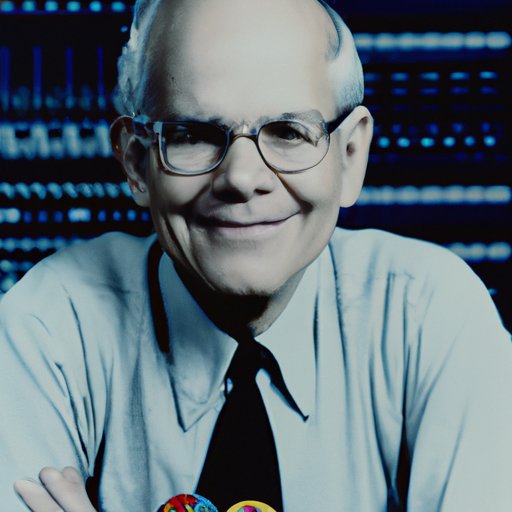Introduction
Integrated circuits are a crucial part of modern electronics and an integral part of our everyday lives. But who invented them? The answer is Jack Kilby, an American electrical engineer and inventor who developed the first integrated circuit in 1958. This article will explore Kilby’s life, his invention, and its impact on modern technology.
Background on Jack Kilby
Jack Kilby was born in 1923 in Jefferson City, Missouri. He graduated from the University of Illinois in 1947 with a degree in electrical engineering and immediately began working for Centralab, a Milwaukee-based manufacturer of electronic components. After five years, he moved to Texas Instruments (TI) where he worked until his retirement in 1983.
Kilby was awarded the Nobel Prize in Physics in 2000 for his work on the integrated circuit and is considered one of the greatest inventors of the 20th century. His other notable achievements include the invention of the handheld calculator, the thermal printer, and the first computer system to use integrated circuits.
Overview of Integrated Circuits and How They Revolutionized Technology
An integrated circuit (IC) is a tiny chip that contains transistors, capacitors, resistors, and other electronic components. They are used in virtually all modern electronics, from computers, smartphones, and televisions to cars, appliances, and medical devices. ICs are responsible for making these devices smaller, faster, and more efficient.
Before the invention of the IC, electronic components were wired together to create circuits. This process was time-consuming, expensive, and prone to errors. With the invention of the IC, these components could be miniaturized and put onto a single chip, resulting in faster, more reliable circuits.

History of the Integrated Circuit
Before the invention of the integrated circuit, electronic components were made using vacuum tubes, relays, and discrete transistors. These components were large and unreliable, and the circuits were difficult to construct. This changed in 1958 when Jack Kilby invented the first integrated circuit.
Pre-Integrated Circuit Technology
Prior to Kilby’s invention, electronic components were large and unreliable and circuits were difficult to construct. Vacuum tubes, relays, and discrete transistors were used to make these components, but they had several drawbacks. Vacuum tubes were bulky, power-hungry, and prone to failure. Relays were slow and prone to wear and tear. Discrete transistors were expensive and difficult to manufacture.
The Invention of the Integrated Circuit
In July 1958, Jack Kilby presented his invention of the integrated circuit at a meeting of the Institute of Radio Engineers. Kilby’s invention allowed for the miniaturization of electronic components, which could then be put onto a single chip. This made it easier to construct circuits and improved their reliability.
Kilby’s invention revolutionized the electronics industry. It allowed for faster, more reliable circuits and enabled the development of smaller, more powerful devices. And it all started with one man’s vision and ingenuity.
Timeline of Development and Use
Since Kilby’s invention, the integrated circuit has seen many improvements and advancements. Here is a brief timeline of its development and use:
- 1960s – The first integrated circuit chips are produced and used in military and aerospace applications.
- 1970s – Improvements in manufacturing processes lead to the development of microprocessors, which are used in calculators and other consumer electronics.
- 1980s – The introduction of VLSI (Very Large Scale Integration) technology allows for the production of larger, more complex integrated circuits.
- 1990s – The development of ULSI (Ultra Large Scale Integration) technology leads to the production of even more powerful integrated circuits.
- 2000s – Modern integrated circuits are used in virtually all modern electronics, from computers and smartphones to cars and medical devices.
Impact of Integrated Circuits
Kilby’s invention of the integrated circuit has had a profound impact on modern technology. It has enabled the development of smaller, faster, and more efficient devices and has changed the way we live our lives.
Modern Electronics
Integrated circuits have revolutionized modern electronics. They are used in virtually all electronic devices, from computers and smartphones to cars and medical devices. Their small size and low cost allow for the production of smaller, more powerful devices.
According to the International Electrotechnical Commission (IEC), “Integrated circuits have enabled the development of a vast range of products, from the simplest consumer goods to sophisticated systems such as spacecraft, airliners, and nuclear power plants.”
Changes to Everyday Life
Integrated circuits have also had a major impact on everyday life. They have enabled the development of new technologies such as the internet, mobile phones, and GPS navigation. These technologies have changed the way we communicate, work, shop, and travel.
They have also enabled the development of new medical technologies such as pacemakers, insulin pumps, and prosthetic limbs. These technologies have improved the quality of life for millions of people around the world.
Conclusion
Jack Kilby’s invention of the integrated circuit has revolutionized modern technology and changed the way we live our lives. His invention enabled the development of smaller, faster, and more efficient devices and opened up a world of possibilities.
Kilby’s invention has had a profound impact on modern electronics and everyday life. It has enabled the development of new technologies and improved the quality of life for millions of people around the world.
Kilby’s invention was a major milestone in the history of technology and will continue to shape our lives for years to come.
(Note: Is this article not meeting your expectations? Do you have knowledge or insights to share? Unlock new opportunities and expand your reach by joining our authors team. Click Registration to join us and share your expertise with our readers.)
